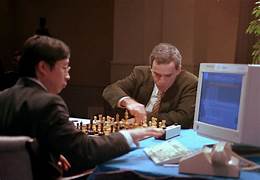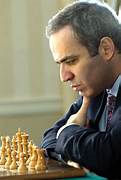 |
 |
 |
 |
Introduction
Garry Kasparov, a name synonymous with chess excellence, has been a towering figure in the world of chess for decades. Known for his intense competitive spirit, deep strategic insights, and unmatched achievements, Kasparov has left an indelible mark on the history of chess. This blog delves into his early life, remarkable career, iconic matches, and his enduring legacy both on and off the chessboard.
Early Life and Introduction to Chess
Garry Kimovich Kasparov was born on April 13, 1963, in Baku, Azerbaijan SSR, Soviet Union. Kasparov's introduction to chess came at a young age, when he solved a chess puzzle set up by his parents. Recognizing his prodigious talent, his parents enrolled him in the Young Pioneer Palace in Baku, where he began formal training. Under the guidance of experienced coaches, Kasparov's skills developed rapidly, and he soon became a formidable player in youth tournaments.
Rise to Prominence
Kasparov's rise in the chess world was meteoric. By the age of 12, he was training at the Mikhail Botvinnik Soviet Chess School, a prestigious institution known for producing top-tier players. His breakthrough came in 1980 when he won the World Junior Chess Championship. This victory marked the beginning of his ascent to the highest echelons of the chess world.
The World Chess Championship
Kasparov's journey to the World Chess Championship was marked by determination and tenacity. In 1984, he challenged Anatoly Karpov for the title. The match, held in Moscow, was one of the most grueling in chess history. After 48 games and five months, it was controversially halted without a winner being declared. In their rematch in 1985, Kasparov emerged victorious, becoming the youngest World Chess Champion at the age of 22. This victory was a pivotal moment in chess history, marking the beginning of Kasparov's dominance.
Dominance in the 1980s and 1990s
Kasparov's reign as World Champion was characterized by his aggressive and innovative playing style. He successfully defended his title against Karpov in several rematches and dominated international tournaments. His rivalry with Karpov, known as the K-K rivalry, is one of the most famous in chess history and produced some of the most memorable games ever played.
Kasparov's deep understanding of chess strategy and his ability to adapt to different opponents made him a formidable champion. His preparation and use of computer analysis set new standards in the chess world, pushing the boundaries of what was possible.
Iconic Matches and Rivalries
Throughout his career, Kasparov faced and defeated many of the greatest players of his time. His matches against Karpov, Nigel Short, and Vladimir Kramnik are particularly notable. The 1993 World Chess Championship against Short was significant as it marked the beginning of the Professional Chess Association (PCA), an organization Kasparov founded to break away from FIDE, the international chess federation.
Kasparov's match against the IBM supercomputer Deep Blue in 1996 and 1997 drew global attention. The 1997 rematch, which Deep Blue won, was a landmark event in the history of artificial intelligence and chess.
Contributions Beyond the Chessboard
Kasparov's influence extends beyond his achievements as a player. He is a prolific author, having written numerous books on chess strategy, history, and his own games. His works, such as "My Great Predecessors" and "How Life Imitates Chess," are considered essential reading for chess enthusiasts.
After retiring from professional chess in 2005, Kasparov became an outspoken political activist and human rights advocate. He founded the United Civil Front, an organization dedicated to promoting democracy and human rights in Russia. His political activities and writings have made him a prominent figure in global political discourse.
Awards and Recognition
Kasparov's contributions to chess and his impact on the global stage have been widely recognized. He has received numerous awards, including the Chess Oscar, and has been inducted into the World Chess Hall of Fame. His legacy as one of the greatest chess players of all time is undisputed.
The Legacy of Garry Kasparov
Kasparov's influence on chess continues to be profound. His innovative playing style, use of technology, and strategic insights have inspired generations of chess players. Kasparov's games are studied extensively, and his contributions to chess theory remain relevant.
Beyond chess, Kasparov's commitment to promoting democracy and human rights underscores his dedication to making a positive impact on the world. His life and career are a testament to the power of intellect, determination, and a relentless pursuit of excellence.
Conclusion
Garry Kasparov's journey from a young chess prodigy to a world champion and global icon is a story of brilliance, resilience, and passion. His contributions to chess, both as a player and a thinker, have left an indelible mark on the game. Kasparov's legacy continues to inspire and captivate chess enthusiasts around the world, proving that his influence will endure for generations to come.